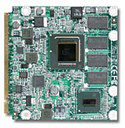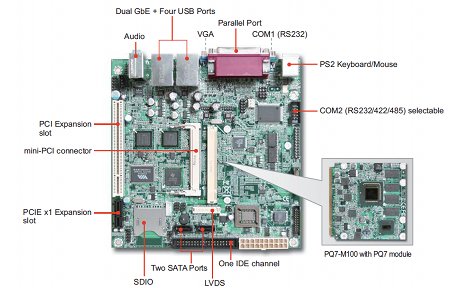Qseven module and carrier board debut
Apr 15, 2009 — by LinuxDevices Staff — from the LinuxDevices Archive — 5 views Portwell has announced a COM (computer on module) based on the Qseven form-factor. Targeting medical, industrial, gaming, and military markets, the PQ7-M100G features Intel Atom Z5xx processors, 512GB of DDR2 memory, gigabit Ethernet, eight USB ports, plus LVDS and SDVO display support, the company says.
Portwell has announced a COM (computer on module) based on the Qseven form-factor. Targeting medical, industrial, gaming, and military markets, the PQ7-M100G features Intel Atom Z5xx processors, 512GB of DDR2 memory, gigabit Ethernet, eight USB ports, plus LVDS and SDVO display support, the company says.
(Click here for a larger view of Portwell's PQ7-M100G)
Qseven is a COM standard released in January by a 14-member consortium, led by Congatec, MSC Vertriebs, and Seco. Promoted as ideal for mobile devices, the 2.75 x 2.75 inch (70 x 70mm) format includes “fast serial differential interfaces,” including PCI Express and Serial ATA, while skipping support for legacy interfaces like EIDE and PCI. It also supports SDIO, plus newfangled graphics and digital media specs such as DisplayPort and HDMI.
According to Portwell, the PQ7-M100G is available with a 1.1GHz Atom Z510 processor, with 400MHz frontside bus, or a 1.6GHz Atom Z530, with 533MHz frontside bus. Either way, the module comes with the SCH US15W companion chip, plus 512KB of soldered-on DDR2 memory.
Interfaces on the module, all provided via the MXM connector (more on MXM below), include LDVS or SDVO graphics, eight USB 2.0 ports, PCI Express, SDIO, LPC, and HD audio. Gigabit Ethernet is additionally present, courtesy of an Intel 82547L chip.

Portwell's PQ7-C200 Mini-ITX carrier board
(Click to enlarge)
Portwell also offers a 6.7 x 6.7 inch (170 x 170mm) Mini-ITX carrier board, the PQ7-C200 pictured above. The PQ7-M100G snaps onto the carrier board, which provides real world interfaces including dual PS/2 ports, a parallel port, a serial port, a VGA output, and dual gigabit Ethernet ports.
In addition to the above, the PQ7-C200 offers a Mini PCI connector, a 32-bit PCI expansion slot, a one-lane PCI Express expansion connector, and two SATA ports. The carrier board also has an SD expansion slot.
According to Portwell, the PQ7-M100G's CPU and companion chip require approximately five Watts. With the PQ7-C200, overall power consumption is said to be approximately 12 Watts.
Features and specifications listed by Portwell for the PQ7-M100G include:
- Processor — Intel Atom Z530 clocked at 1.6GHz, or Z510 clocked at 1.1GHz
- Memory — 512MB of soldered DDR2 RAM
- Networking — Gigabit Ethernet
- Other I/O:
- 8 x USB 2.0
- HD Audio
- SDVO and LVDS video, with support for dual independent displays
- LPC bus
- 8 x USB 2.0
- Expansion:
- PCI Express
- SDIO
- PCI Express
- Operating temperature — 0 to 60 deg. C (32 to 140 deg. F)
- Dimensions — 2.75 x 2.75 inches (70 x 70mm)
Background
The Qseven form-factor includes a “golden finger” connector originally designed for laptop graphics cards using Nvidia's MXM (Mobile PCI Express Module) format. The connector, re-purposed here as a CPU module interconnect, provides 230 positions, .020-inch pitch, and 5.5mm and 7.8mm height options.
 Embedian's MXM-8310 (Click image for further information) |
As far as we know, the first Qseven product to ship was Congatec's conga-QA, announced in December 2008. Other COMs have used MXM connectors, however: Embedian first pressed MXM into service last year for its MXM-7110 and MXM-7114, modules that sport Samsung S3C2440A processors and a smaller, 66 x 50mm format. These products were joined in July by Embedian's MXM-8310 and MXM-8110, with onboard Marvell PXA320 processors.
Further information
Portwell did not release information about availability, pricing, or operating system support for the PQ7-M100G. Due to the standard Intel chipset used, however, the device should be compatible with Windows XP, Windows XP Embedded, Windows CE, and Linux.
More information on the PQ7-M100G and PQ7-C200 may be found on the company's website, here and here.
This article was originally published on LinuxDevices.com and has been donated to the open source community by QuinStreet Inc. Please visit LinuxToday.com for up-to-date news and articles about Linux and open source.